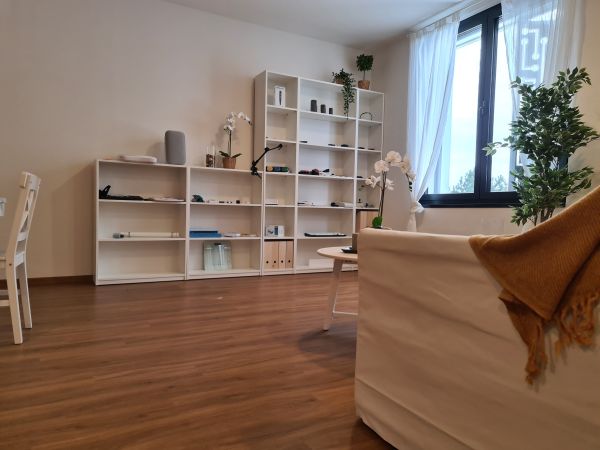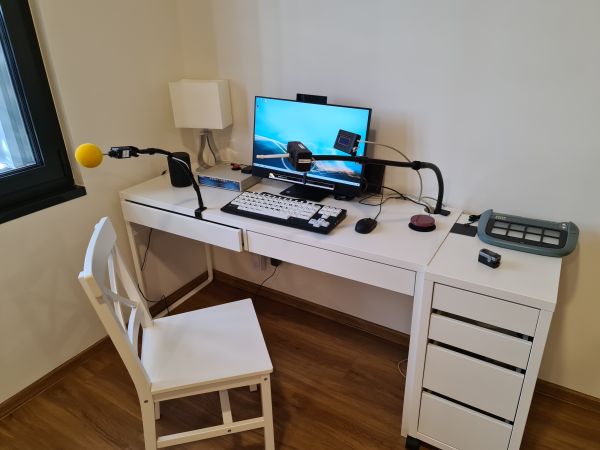A new Biomedical Assistive Technology programme is being opened by VSB-TUO. It is intended that future students will learn to master and design technology that help elderly people or those with physical disabilities. Assistive technologies, such as voice or eye control of computers, specially adapted floors or computer mice, and telemedicine are on the rise in the Czech Republic and throughout the world. Teaching will be non-traditional: students will train in special apartments crammed with modern technology.
A floor that detects where a person is inside an apartment - and if they have fallen over. Devices for sensing eye movements that allow you to control the surroundings - such as positioning a bed or opening a window. On the shelf, rings, glasses and bracelets with built-in technology measuring the frequency and depth of breathing or heart activity. This is not a futuristic sci-fi description of human dwellings, but a plausible depiction of two flats that are located in Ostrava and serve as training laboratories for future students of the new programme.
The bachelor's programme in Biomedical Assistive Technology will welcome the first students at the Faculty of Electrical Engineering and Computer Science at VSB-TUO in the winter semester. The above-described (and other) assistive technologies and telemedicine solutions which help the elderly or the physically handicapped are increasingly being used in the Czech Republic.
Graduates will be able to choose appropriate aids and rehabilitation for their client's needs. Then they will be able to control and program these technologies and adjust their operation precisely according to these requirements.
For example, electronic communicators, which allow deaf people or people with reduced pronunciation to communicate with their surroundings using buttons, are already in common use. An alternative mouse is also available, specially designed to be used by people with limited hand motor skills or poor hand-eye coordination. Voice activation is also used to control homes or computers, and special devices allow you to control technology by moving your eyes.
"We have prepared this new programme because the offer of telemedicine services has multiplied in the last ten years, and further significant development of telemedicine can be expected in the coming years. We also perceive a dramatic increase in the use of modern technology in the field of assistive technologies, for example, controlling a computer with your eyes is available to almost everyone today, "says Martin Černý, who works at VSB-TUO in the biomedical engineering group and is the guarantor of this new programme.

"We know from experience that there is a great demand for professionals who can work with these devices and equipment because clients need to be provided with technical support or help looking for the right technical solutions due to their disability. At the same time, we follow educational trends in this area. The Nordic countries are highly focussed on this issue. The closest similar study programme is being taught in Vienna,” adds Černý.
Students are free to choose their focus
The study programme is also different in that it combines basic engineering skills from several areas so that students will not only learn to work with the devices, but also to design them; they can programme them or modify them differently according to the client's needs. They will gain basic knowledge in the fields of electrical engineering, telecommunications, computer science and biomedical engineering.
"However, we cannot look at the issue of assistive technologies only from the point of view of technology, and therefore students will gain knowledge in the fields of nursing, psychology and social services. In the field of telecommunications, they will focus on the types of communication networks, wireless networks and the basics of security in communication networks. In the field of informatics, they will focus on algorithmisation, i.e. on the creation of algorithms and programming procedures, as well as on database systems and program creation,” says Černý.
Likewise, students will learn the principles and methods of measuring biological signals, such as ECG, EEG, blood pressure or heartrate, and also gain an overview of therapeutic devices.
The new study programme has a large proportion of optional subjects, which altogether could cover one whole semester, which is rather exceptional for technical bachelor's programmes. Students will be free to choose which technical areas they want to focus on. Whether from the point of view of telecommunications, connecting individual devices to networks and the design of these networks, or from the point of view of informatics, where they will be able to improve programming and database creation, or from the point of view of medical technology and home automation, where they will adjust the home environment according to the needs of their client.
Futuristic Simulators
This new programme, with its focus on the home environment, utilises a unique tool - two specially equipped apartments, or rather residential laboratories, where all the study areas intersect. The 2 room apartments are equipped with technology.
One group consists of expensive reference technologies, such as a positioning floor, which knows where a person is and if they have fallen over. This includes technologies for accurate measurement of biological signals, such as respiratory rate and depth or heart rate measurements. In the same way, in these completely new flats, there are means of assistive technologies and telemedicine solutions that clients in social services can already buy today. These include the aforementioned communicators, which allow you to give commands without a voice at the touch of a button, computer mice for people with disabilities, devices for sensing eye movements and their use in controlling the immediate environment, automatic drug dispensers, or wearables, i.e. electronic aids for measuring life functions stored in everyday objects, such as bracelets, rings or glasses.
A separate part in these apartments is the home automation system, i.e. automatic control of shutters, blinds or lighting. "These apartments also have hollow walls, in which there are installation spaces, so that new assistive technologies can be added easily," adds Černý. Students will be able to test their skills of designing and operating technologies directly on the University grounds, but in an authentic simulated apartment environment, as if they were in the client's home.

In the implementation of the programme, VSB-TUO is also cooperating with the University of Ostrava, where there are experts from the fields of nursing and social studies who help students. They also have experience in the field of assistive technologies, but from a nursing rather than technical point of view.
Cooperation with the hospital
Graduates of the new Biomedical Assistive Technology programme will be employed, for example, by companies that provide devices and services in the field of assistive technologies and telemedicine in general. A large proportion of graduates will work directly with social service providers, such as retirement homes, Alzheimer's centres, home visit social services, or in organisations providing compensatory aids and technologies.
Employment doesn't only have to be with companies and organisations that provide these services. They can also work in large companies that rent apartments to elderly people and want to provide them with these technologies as part of the lease. VSB-TUO already cooperates with industry in the field of neurocognitive rehabilitation (e.g. rehabilitation of people with severe brain damage - editor's note).
"As part of a clinical study at the University Hospital Ostrava, we are testing rehabilitation in the home environment using telemedicine approaches," adds Černý.
Part of the study programme also includes internships that can be completed in two forms. The first option is to go directly to social service providers, and gain experience in caring for disabled people or the elderly. "This part is guaranteed by colleagues from the Faculty of Social Studies at the University of Ostrava. The second option is to gain experience at technology companies. An example is the providers of telemedicine solutions, and companies focused on creating facilities for people with disabilities, "adds Černý.
In total, the school is ready to admit fifty to one hundred first-year students to the programme.
The construction of the laboratories was supported by the FEI CPIT TL3 New Technology Platform project CZ.02.2.67/0.0/0.0/16_016/0002467.
